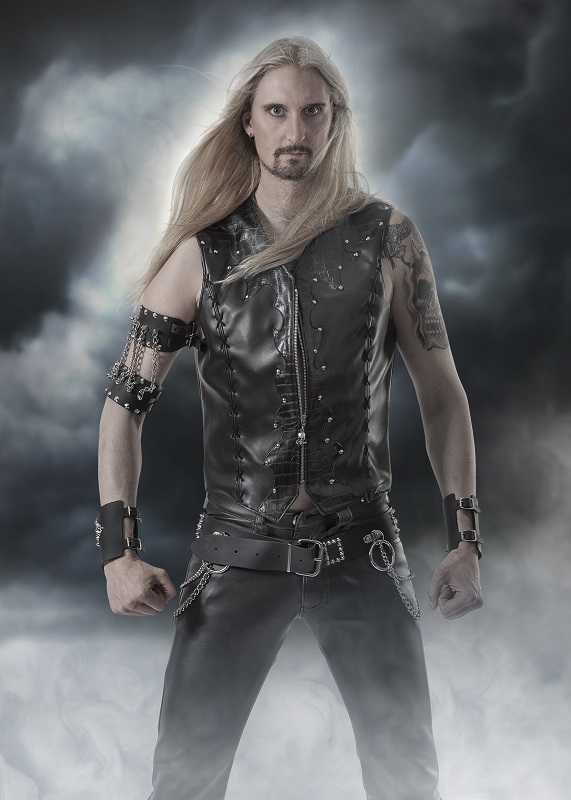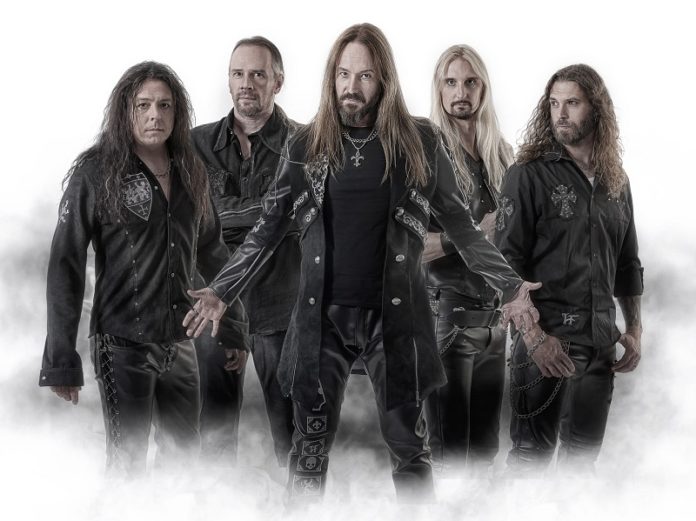I remember the first time I listened to Hammerfall. It was my first year of college and some classmate kept trying to make me listen to “The Dragon Lies Bleeding”, from Glory to the Brave. Considering that I had just started listening to Stratovarius, Gamma Ray and other European metal bands, it seemed like a good idea.
Even though I had already been exposed to European power metal (even if Hammerfall don’t really like the moniker) I was blown away by what I listened. Joacim Cans‘ voice was truly impeccable, and the performance of the whole band was beyond reproach. Although I was not too happy with the production, it was more than enough to get me hooked. After all, if this was the debut album, things could only get better. And they certainly did.
As part of the celebration of the 25th Anniversary of the Wacken Open Air Festival, Hammerfall performed a special set revisiting Glory to the Brave. We met with guitarist Oskar Dronjak, the only remaining original member of the band (since 1993), to look back on their history, as well as to talk about their new album, (r)Evolution.
Metal Blast: Joacim Cans mentioned that after the release of Infected the band really needed some time off. What caused this need for a hiatus?
Oskar: We were in a bit of a creative standstill. We were on a never-ending cycle where we were always on the road or in the studio or promoting or recording, and we had been like that for 15 years. It doesn’t matter how much you love what you’re doing, if you have to do it all the time it’s going to get boring after a while. Although it’s never boring to play, some of the excitement was gone, so we decided that we needed to take a break. It was very good for us.
MB: Do you think that for a band like Hammerfall, having been together for so long, there’s always a risk that if you don’t take a break you’ll just implode?
Oskar: I think so. If we hadn’t taken this break and just went back into songwriting right away and started recording a new album… I’m not sure that we’d be here today. Things weren’t as fun anymore, there were a lot of problems.
For a couple of years we had problems with managers, everything felt like a hassle and nothing ever worked; they didn’t do what they were supposed to do, so we didn’t really trust them. There were a lot of issues that made the business part almost more important than the musical part; we are supposed to be playing in a band, not running a company. Hammerfall have always been a self-managed band, until 2009 we never had a real manager… which is when the problems started.
MB: Well, you don’t change horses in midstream!
Oskar: That was a mistake, but we did need to shake things up a little bit. We started working with a manager, we changed our booking agency (All Access), with whom we had been since day one; that was another mistake, because they had been helping and guiding us a lot. Now we’re back with them again!
MB: Did you just become too overconfident and decided to change everything?
Oskar: We had been self-managed for a long time, but we had a booking agency to fallback on and help us make the right decisions. Without them we probably wouldn’t be able to do what we do, they’ve help us stay on the correct path, without ripping us off. We’ve always had people around us that, although weren’t managers, have always been there helping us to keep the band where we wanted it. We have always had a relation of trust with them, which is great because as you increase in popularity it becomes harder to keep away the vultures.
People realize that there’s money to be made, so they come. When Glory to the Brave was released we came out of nowhere and had a pretty big success right away, so we didn’t need to be built up, we just exploded. When we did this we had meetings with a lot of prospective managers who promised us many things, even though what they really wanted was to just get on this train that was already running at full speed.

MB: An interesting aspect of your hands-on approach towards Hammerfall is that you’re also in charge of production duties. Why did you decide to also tackle that challenge?
Oskar: If you want to be completely satisfied, you have to do it yourself. If somebody else does it, it might be good but there will always be things you would have done differently. I have a pretty big need for control over certain things, and so does Joacim (he’s even worse than I am! [laughs]). You also save money, since the fact that we can do it ourselves means that we don’t need to hire a producer.
When it comes to writing songs, I don’t just come up with some ideas to finish in the studio; when we go into the studio everything is already written, so it’s more or less about just going there and performing.
MB: Your Wacken show was really amazing, since you were able to work with some of your past members as well. How did this come about?
Oskar: Two years ago we did the a special 15th anniversary show for Glory to the Brave in Sweden, for which we invited some of our past members to perform with us. We thought that we should do something similar this time around, because this set is more or less what we did in 1997 when we played here. When we decided to do it we thought it’d be a good idea to invite Stefan [Elmgren] and Patrik [Räfling], both of whom played here back then.
MB: Speaking about Glory to the Brave; if you compare some of that classic Hammerfall material, with your most recent output, there seems to be a shift from your power metal sound.
Oskar: Power metal didn’t exist when we started out. I call our music simply “heavy metal” because that’s what it was in the beginning.
When Hammerfall started and we were playing melodic metal with clean vocals, it was something that nobody else was doing in Sweden; nobody liked it, and said that it was something from a past era. We knew better; we love heavy metal, we are a heavy metal band, so we decided to make heavy metal our own and not be ashamed of that sound. This is why I have a problem when people say that Hammerfall is “power metal”, because we fought so much for heavy metal that I don’t really want to be put in a different category; of course, I understand why people say it, because of the power metal genre that came around in the beginning of the century.
MB: I guess it also coincided with the lyrical themes that you were touching upon, although you also moved away from that.
Oskar: That was Joacim‘s maturing process as well, because he writes most of the lyrics.
In Infected, for example, he wanted to write some different things (like zombies, etc.); I think it worked, because the songs fit really well with the lyrical content. He didn’t want to turn into Manowar, who always thing about the same stuff. I love Manowar, but there’s very little variation.
MB: Let’s talk about (R)evolution, your new album. What’s with the name?
Oskar: It came from the movie “Rise of the Planet of the Apes”. In Sweden they translated the title to “Apornas planet: (r)Evolution” (“Planet of the Apes: (r)Evolution”), and I really liked that title, because it fit really well with the film, so I kept it.
MB: Maybe I’m stretching it too much, but do you think that it’s also about the “evolution” in the band itself?
Oskar: Yeah, that’s part of the meaning for us. We see an evolution from the first to the last album. This new album has a lot of connection with the first ones, the production from Fredrik Nordström, the cover by Andreas Marschall, and just the attitude of the band. After we took the break the emotion in the band was back, and I think that you can hear that in the songwriting and in the performance itself. When we were recording we were constantly asking each other if every new take was OK and whether it was “hungry” enough; whether it was on the edge.
I think that our evolution has been about taken all the bits and pieces that we liked from our career and putting them together into (r)Evolution.
MB: Do you feel that Hammerfall will always face some sort of prejudice because of the name? That it’ll always be seen, prima facie, as a nerdy, geeky band?
Oskar: Yes, definitely. It’s funny, because we did one song about a dragon (and if you read the lyrics it isn’t even about a dragon!), “The Dragon Lies Bleeding”, and didn’t do any more dragon-related songs for years, and yet people still think that we sing about dragons and wizards and stuff like that.
MB: Well, there’s also the issue of your album covers.
Oskar: Sure, they are fantasy-based, but there are no dragons, magicians or any of the typical things. For me it has always been like what happens in the saga of A Song of Ice and Fire, where the fantasy elements are more accidental than anything else. It’s the same thing here; it might be fantasy-based, but it’s not all-out fantasy.
MB: Speaking of covers, were you surprised to see how angry fans were due to Hector’s absence from the cover of Infected?
Oskar: We didn’t realize how important people thought it was to have him on the cover! It was a surprise.
The album cover of Infected, the white one, I loved it, but Nuclear Blast didn’t like it at all so we had to compromise on a black version that just looks awful… I’m ashamed of that cover.
This time we decided very early on, because of all the comments and criticisms, that we’d have Hector on the cover, with Andreas Marschall being in charge of designing it.
MB: I’m afraid that this is all the time we have; thank you very much Oskar. I’ll see you on tour next time!
Oskar: Thanks for a great interview!



